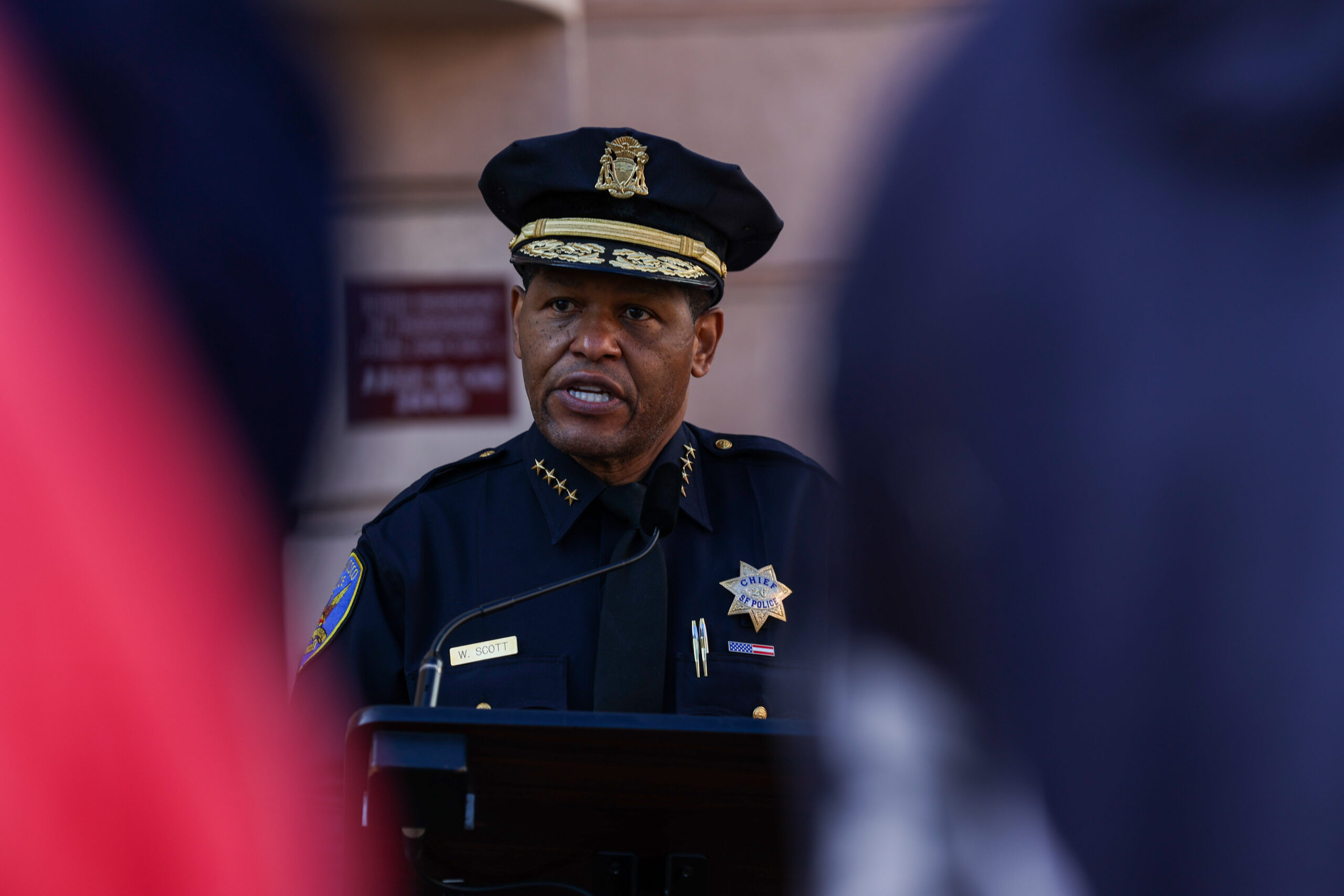District Attorney Chesa Boudin accused Police Chief Bill Scott of bowing to political pressure from the police union last week after the chief severed an agreement that put prosecutors in charge of investigating police shootings and other use-of-force cases.
But now Chief Scott—who faced a possible vote of no confidence from the department’s union—is under criticism from his civilian bosses on the Police Commission, who say they were blindsided by his decision to abandon a key piece of police reform. The commission, which has the power to fire the chief, is now considering ordering him to reverse course.
Scott pulled out of the agreement last Wednesday over allegations that the District Attorney’s Office withheld evidence while investigating a police officer for beating a man with a baton. The chief accused prosecutors of violating the agreement by not sharing information with his department as the two agencies conducted parallel investigations into the incident.
The decision to withdraw from the agreement without first consulting the Police Commission exasperated commission President Malia Cohen. The agreement is a key part of the police reform efforts started in San Francisco following a series of deadly police shootings in 2015.
“It sets back the work that we have been putting in place for almost the last 10 years,” said Cohen, who previously served as president of the Board of Supervisors.
Cohen scheduled a hearing on the chief’s decision for Wednesday night, when she said the chief will need to make a compelling argument to the commission in defense of his actions.
Board of Supervisors President Shamann Walton and Police Commission Vice President Cindy Elias joined Cohen in criticizing Scott for pulling out of the agreement.
“We have all fought so hard for police reform and SFPD cannot be the lead on investigating officer-involved shootings,” Walton said. “That would most certainly be a backwards step.”
Elias said the chief made a “hasty and poorly timed decision” when “there was no emergency.” She said having the department take the lead on investigations into police shootings by its own officers “seems like a huge step backwards.”
Scott announced his decision last Wednesday in an escalation of the long-simmering conflict between police and the city’s progressive top prosecutor.
The announcement came as Boudin prepared to put an officer on trial for the first time in his career. The officer, Terrance Stangel, is accused of using excessive force against a man, Dacari Spiers, while responding to a 911 call reporting domestic violence in Fisherman’s Wharf in 2019. It’s the first-ever trial against an on-duty San Francisco police officer for an unlawful beating and opening statements began Monday.
Scott said he pulled out of the agreement in response to the testimony of a District Attorney’s Office investigator, Magen Hayashi, who said in court last month that she felt pressured to leave out evidence of the domestic violence from an affidavit for Stangel’s arrest. She also said there was an understanding within her unit that they should not share information with the police.
Hayasahi testified as part of a motion to dismiss the case from a defense attorney for Stangel. However, a judge found that the evidence in question would not have cleared him.
In an email Monday, Matt Dorsey, a police spokesperson, said the chief understands the agreement is a key reform measure but the District Attorney’s Office “betrayed a public trust both our departments owe to the San Franciscans we serve.”
As recently as March 2020, a consulting firm for the California Department of Justice, which oversees police reform efforts in San Francisco, hailed the agreement between police and the District Attorney’s Office as a “critical reform.”
“An independent skilled investigator brings knowledge and legal understanding of use of force incidents that allows for a thorough review,” wrote the consulting firm, Hillard Heintze. The District Attorney’s Office “provides professional investigation and review, independence and accountability as the DA is an elected official and responsible to the community.”
Max Szabo, who worked as a spokesperson for former District Attorney George Gascón, said the agreement is vital to protect the integrity of investigations. Scott first reached the agreement with Gascón in 2019 before renewing it last year with Boudin.
Before the agreement, officers accused of crimes “were allowed to review evidence that could be used in a prosecution against them before giving a statement, which is not a luxury that would be awarded to anyone else under criminal investigation,” Szabo said.
Dorsey said Chief Scott has asked the state DOJ to step in as the independent investigator and fill the role of the District Attorney’s Office.
“We haven’t heard back about our request yet, but we’re also seeking their guidance about possible other options that could include reciprocal investigation agreements with outside counties,” Dorsey said.
A DOJ spokesperson confirmed that Scott reached out but no other updates were available.
While Chief Scott announced he would leave the agreement last Wednesday, there is a 15-day notice period before the agreement is terminated. The chief and Boudin are also required to meet to discuss any issues before the partnership ends.
Phelicia Jones, founder of a group called Wealth and Disparities in the Black Community, challenged the Police Commission to take action Wednesday.
“They need to stop playing politics with the lives of San Franciscans, which include all of us, particularly Black San Franciscans who get the brunt end of it,” Jones said.
Matt Smith contributed to this story.
